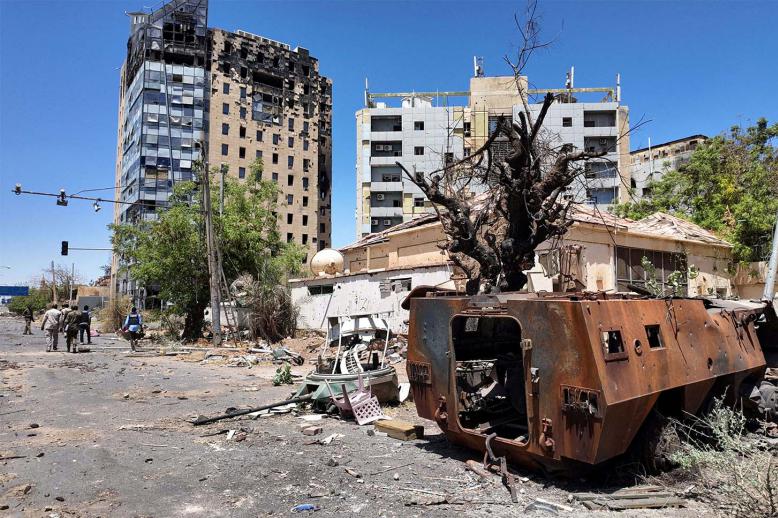In Sisi’s Egypt, army plays major role across society
CAIRO - “The army and the people are one hand,” Egyptians chanted during the ouster in 2011 of Hosni Mubarak and again in 2013 when Muslim Brotherhood President Muhammad Morsi was removed from office. The army has always enjoyed a unique position in Egypt but it is a role that has steadily increased under Egyptian President Abdel Fattah al-Sisi.
Military factories that had been dedicated to military industries are focusing on a broad range of products for civilian consumption — from refrigerators to cookers, solar panel cells to air conditioners. The Egyptian military has also taken a leading role in overseeing of new national projects initiated under Sisi, including the Suez Canal expansion and the construction of the new administrative capital.
Questions about the increasing role that Egypt’s military is playing comes as parliament approved a bill granting senior army officers rare privileges, including effectively guaranteeing them immunity from prosecution.
The bill does not allow court trials for generals unless approved by the Supreme Council of the Armed Forces, the decision-making organ of the Egyptian armed services. The measure grants army generals financial benefits that had only been enjoyed by cabinet ministers.
“The impression such a bill gives is that those ruling our country have no respect whatsoever to either the constitution or the law,” said Hassan Nafaa, a political science professor at Cairo University. “There is no legal or constitutional justification to give the generals all these privileges.”
Sisi’s latest cabinet, announced in June, saw the appointment of an unprecedented number of ministers from military backgrounds, not just General Mohamed Ahmed Zaki being appointed defence minister but also Major-General Mahmoud Tawfik being appointed interior minister and Major-General Mahmoud Sayed Abdel Hamid Shaarawi being appointed minister of local development.
Army officers, and particularly generals, have always been a favoured elite of Egypt’s presidents, from Gamal Abdel Nasser, the army officer who led the Free Officers Movement that overthrew the monarchy in 1952 and established the modern Egyptian republic, to Mubarak but privileges recently given to army officers have been unprecedented, analysts said.
The salaries and the pensions of army officers have been raised numerous times in the past five years. The raises are coming at a time Egypt suffers tough economic conditions and the government is applying austerity measures on the public.
Egypt’s more than 6 million civil servants had been fighting for a raise to cope with surges in food prices. Despite this, there has been no corresponding rise in civil servants’ salaries, even though the government has been careful to incorporate bonuses and other financial measures with austerity reforms.
Egypt’s pensioners are also finding that their pensions are far from sufficient to meet commodity price rises, even as Egypt’s military entered the pharmaceutical industry to ensure cheaper prices for vital medicines.
“The government keeps asking the people to economise on their spending but it keeps favouring army officers by giving them unparalleled benefits,” said Mohamed Anwar al-Sadat, a former member of parliament who was sacked in February 2017 for — among other things — inquiring about the salaries of army officers. “This is why everybody is angry.”
In Egypt, army officers get flats and cars at subsidised prices. They have their own hotels, restaurants, clubs and beaches.
Sisi, political analysts said, was keen to ensure the loyalty of the generals during difficult times. Sisi himself had previously served as army chief of staff.
Egypt has been fighting a branch of the Islamic State in Sinai for several years. It has been struggling to finish off terrorist organisations affiliated with the Muslim Brotherhood.
The army has been at the heart of all these battles, with the military establishment losing dozens of officers and hundreds of troops in battles against terrorist groups.
It was the military that prevented Egypt’s polarisation and a potential civil war before and after Morsi’s ouster. With conscription in Egypt still in force, the military remains very popular, with almost all people having some ties to the army.
However, with many ordinary Egyptians suffering under a harsh austerity programme, questions are being asked about why army officers are being granted even greater privileges.
The Egyptian Army has become an intrinsic part of all economic activities in Egypt. Critics complain that the private sector is unable to compete. Sisi said in March that the military economy amounted to less than 4% of Egypt’s GDP. However, with Egypt’s military budget and revenues shrouded in secrecy, few can be certain about the total monetary value of Egypt’s military.
Egyptian Assistant Defence Minister Mamdouh Shahin said the new bill contained no preferential treatment for the army generals. Other segments of society, Shahin said, were honoured before in recognition for the sacrifices they offered their country.
“Recognition of the sacrifices made by army generals is tantamount to recognition of the sacrifices made by the armed forces as a whole,” Shahin said, “but in this, the generals should not be seen by anybody as a preferred segment of society.”
Ibrahim Ouf is an Egyptian journalist based in Cairo.
This article was originally published in The Arab Weekly.







